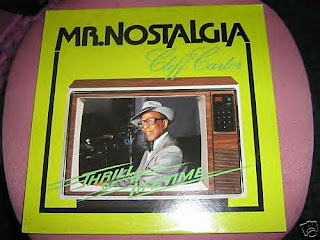
I had the privilege of meeting Jan Peerce twice - once at Plateau Hall in Montreal when I was a young girl and years later at Place des Arts along with my husband, Cliff Carter.
This wonderful tenor was also a fine gentleman, cordial and delightful to chat with, even for a few moments. He was kind, modest and charming - yet who today has even heard of his name?
Jan Peerce's recording of the Blue Bird of Happiness is a treasure. I cannot copy the sound here, but even the lyrics are beautiful, and Jan Peerce's sweet tenor voice remains in my memory even when I am not listening to the record.
JAN PEERCE AND CLIFF CARTER
TED BLACKMAN COLUMN
THE GAZETTE
OCTOBER 23, 1979
"No Business Like Show Business ... Two 77 year olds, Myron Cohen and Cliff Carter, reminiscing backstage Saturday night after Cohen and Jan Peerce drew several standing O's (ovations) for their splendid performances at Place des Arts. Carter still playing the Pointe Claire Holiday Inn Saturday nights worked the Chez Paree with Cohen 25 years ago."
I was with Cliff that evening in the small dressing room at Place des Arts shared by Jan Peerce and Myron Cohen. On other occasions, I was with Cliff at Place des Arts with Count Basie, The Mills Brothers, Liberace and Victor Borge.
See MR. NOSTALGIA, CLIFF CARTER - http://cliffcartermrnostalgia.blogspot.com

The Jewish American tenor, Jan Peerce (real name, Jacob Pincus Perelmuth), grew up in the New York City streets, and attended De Witt Clinton High School and Columbia University. Like so many others of his generation, he had taken violin lessons, and his first regular money was earned by playing the violin in public. As part of the program he would also sing popular songs, and the discovery came almost accidentally that he had an extraordinary voice.
In 1932 an engagement followed as tenor soloist with the Radio City Music Hall company. Its radio broadcasts and stage programs embraced light classical music and great moments of opera, and Jan Peerce soon had a nation-wide following. Concert engagements came, and then a sudden and extraordinary leap to fame. He made his operatic debut in May 1938 Philadelphia as the Duke of Mantua in Rigoletto, and gave his first solo recital in New York in November 1939.
Jan Peerce's lyrical voice attracted attention. The great conductor, Arturo Toscanini, heard him and found him to be the tenor he had been looking for to sing the leading roles in his broadcasts and recordings of opera and choral works. The recordings that followed these broadcasts are among the outstanding musical legacies of our time. Soon the "living" operatic stage beckoned in San Francisco and then New York. Jan Peerce made his debut with the Metropolitan Opera Company on November 29, 1941 singing Alfredo in Verdi's La Traviata. He sang also the parts of Cavaradossi in Tosca, Rodolfo in La Bohème, and Charles Gounod's Faust. He was hailed by the critics as the "All-American successor to the 'greats' of opera's almost extinct 'Golden Age.'" He has since become a celebrated name in the world's musical centres, and in 1956 made a sensation in Moscow as a musical "cultural exchange" ambassador, being the first American to sing with the famed Bolshoi Theatre opera. He remained on the staff of the Metropolitan until 1966, appearing again in 1966-1967. He was pressed to return not only to sing but also to teach a master class. He continued to make occasional appearances until his retirement in 1982. He was the brother in law of Richard Tucker.
So entranced had Arturo Toscanini been with Jan Peerce's stylistic mastery, depth of feeling and beauty of line in Verdi's and Puccini's music that he claimed Peerce must have had some Italian ancestry. But of course Peerce is equally distinguished in George Frideric Handel, J.S. Bach, German Lieder and French art song. In fact, his first broadcast with Arturo Toscanini was in L.v. Beethoven's Ninth Symphony, and another famous performance was that of Florestan in L.v. Beethoven's Fidelio. Peerce also prizes his long association with the Bach Aria Group, where as he says, "the artist is only another instrument."
So entranced had Arturo Toscanini been with Jan Peerce's stylistic mastery, depth of feeling and beauty of line in Verdi's and Puccini's music that he claimed Peerce must have had some Italian ancestry. But of course Peerce is equally distinguished in George Frideric Handel, J.S. Bach, German Lieder and French art song. In fact, his first broadcast with Arturo Toscanini was in L.v. Beethoven's Ninth Symphony, and another famous performance was that of Florestan in L.v. Beethoven's Fidelio. Peerce also prizes his long association with the Bach Aria Group, where as he says, "the artist is only another instrument."
| Born: June 3, 1904 - New York City, New York, USA |

THE BLUEBIRD OF HAPPINESS
- The beggar man and the mighty king
- Are only different in name,
- For they are treated just the same by Fate.
- Today a smile and tomorrow a tear,
- We're never sure what's in store
- So learn your lesson before it is too late.
- Are only different in name,
- So be like I
- Hold your head up high
- Till you find the bluebird of happiness.
- Hold your head up high
- You will find
- Greater peace of mind
- Knowing there's a bluebird of happiness.
- Greater peace of mind
- And when she sings to you
- Though you're deep in blue
- You will see a ray of light creep through.
- Though you're deep in blue
- And so, remember this
- Life is no abyss
- Somewhere there's a bluebird of happiness.
- Life is no abyss
- The poet with his pen,
- The peasant with his plow,
- It makes no difference who you are,
- It's all the same somehow.
- The peasant with his plow,
- The king upon his throne,
- The jester at his feet,
- The artist, the actress,
- The man on the street.
- The jester at his feet,
- It's a life of smiles,
- And a life of tears,
- It's a life of hope,
- And a life of fears.
- And a life of tears,
- A blinding torrent of rain
- And a brilliant burst of sun,
- A biting, tearing pain
- And bubbling, sparkling fun.
- And a brilliant burst of sun,
- And no matter what you have
- Don't envy those you meet,
- It's all the same, it's in the game
- The bitter and the sweet.
- Don't envy those you meet,
- So be like I
- Hold your head up high
- Till you find the bluebird of happiness.
- Hold your head up high
******************
MR. NOSTALGIA, CLIFF CARTER - http://cliffcartermrnostalgia.blogspot.com

No comments:
Post a Comment